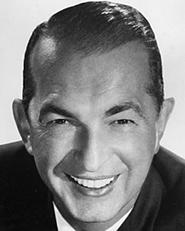Liner notes from original albums and CDs for proofreading
 Sounds
Sounds
for right now
this very moment:
TODAY'S THEMES FOR YOUNG LOVERS.
Percy Faith's
replendent orchestra-with-chorus
arrangements of
The 59th Street Brudge Song
(by Paul Simon of Simon & Garfunkel)
Yellow Days
(a melodic sunburst)
Windy
(fresh and bracing)
A World of Whispers
(a great Faith original)
Somethin' Stupid
(somethin' else!)
and half a dozen
more hits
are bold
and satisfying.
TODAY'S THEMES FOR YOUNG LOVERS
are as big and bright
as the summertime sun.
Can a 52-year-old arranger-conductor cut one of the best-selling instrumentals of the rock era? The answer for Percy Faith was a resounding yes. The man known for Theme From A Summer Place was well into middle-age when he did an easy listening version of the theme from the popular movie. He already had a long string of hit albums and singles, had provided instrumental backing for other artists on their successful recordings and was a noted radio and TV arranger.
He was born April 7, 1908, in Toronto, Ontario, Canada. By the time he was 6, Faith had demonstrated musical abilities, drumming out rhythms on family chinaware. Unwilling to encourage his drumming interests, Faith’s dad responded to his son’s musical interests by buying him a violin and paying for lessons. After three years of fiddling, Faith turned to the piano, which provide to be his forte.
By the time he was 11, Faith was working professionally, providing “Cowboys and Indian” music for silent films in a Toronto theater. The youngster was so short he had to sit on a stack of sheet music to reach the piano. For his efforts, he took home $3 a night and carfare. When he was 15, Faith debuted as a concert pianist and at 18 was writing special arrangements for other musicians and touring with a small concert group.
In 1928, Faith and Joe Allabough, who would go on to manage a radio station in Chicago, formed a radio team they called “Faith and Hope.” Faith was responsible for the music and Allabough, or “Hope,” was the comedian. By 1933, Faith was a staff conductor, arranger and pianist for the Canadian Broadcasting Corporation, a position he would hold for seven years. His duties included writing music for special programming including coverage of a visit to Canada by the King and Queen of England.
Faith’s work in Canada was not unnoticed by broadcasters in the United States, and, in 1940, he left his home country to serve as musical director for NBC. By 1950, he was working for Columbia Records, charting with Cross My Fingers, featuring a vocal by Russ Emery. He went Top 10 that year with All My Love, followed by the holiday themed Christmas In Killarney, done with the Shillelagh Singers.
Besides arranging and producing hits for himself, Faith worked his musical magic as an arranger and producer for a number of artists including Tony Bennett, Johnny Mathis, Doris Day and others. He was also an accomplished writer and his My Heart Cries For You was a hit for Guy Mitchell, Dinah Shore and Vic Damone in the ‘50s.
Although he was busy with other Columbia artists, Faith continued to have his own hits. In the spring of 1951 he went Top 10 with On Top Of Old Smoky, an old folk song that featured a Burl Ives vocal. He also did well with When The Saints Go Marching In and its flip-side, I Want To Be Near You. In the spring of 1952, he topped the charts with Delicado, featuring Stan Freeman on harpsichord.
In the spring of 1953, Faith had a hit with Swedish Rhapsody. After about a month, the B-Side, Song From ‘Moulin Rouge’ (Where Is Your Heart), with a strong vocal by Felicia Sanders, charted and went all the way to No. 1, where it stayed for 10 weeks, earning Faith his first gold record. He followed with another movie theme, Return To Paradise, and closed out the year on the charts with Many Times.
Faith continued to score popular singles with his lush instrumental sound even as rock ‘n roll took over the pop charts. In 1954 he did well with Dream, Dream, Dream and The Bandit. In ’56, he charted with Valley Valparaiso, We All Need Love and With A Little Bit Of Luck. He continued to do well with albums, especially the romantic “Passport To Romance,” issued in 1956, and a collection of songs from “My Fair Lady” that went Top 10 in 1957. His albums were also popular in the ‘60s, as he opened the decade with the Top 10 “Bouquet.” Faith also went Top 10 in 1960 with “Jealousy” and did the same in early ’61 with songs from “Camelot.”
Faith would go to #1 again with another movie theme. “A Summer Place” was a 1959 film that starred veterans Richard Egan and Dorothy McGuire as disapproving parents while teen stars Sandra Dee and Troy Donahue played misunderstood young lovers. The theme was written by Max Steiner and recorded by Faith in September 1959.
There was some radio play for Theme From “A Summer Place,” but it took almost six months for the record to finally catch on. It charted in the second week of 1960 and headed to the top of the Billboard pop charts, where it remained for nine weeks, selling more than a million copies. It also won a Grammy as record of the year and picked up nominations for best performance by an orchestra and best arrangement.
Theme From “A Summer Place” was followed by the Top 40 Theme For Young Lovers. Meanwhile, Faith’s albums continued to reflect his more adult-oriented sound, as “Mucho Gusto! More Music Of Mexico” sold well in 1961 and “Bouquet Of Love” and “The Music Of Brazil!” were hits in 1962. In 1963, Faith tried something different. That summer, the “Themes For Young Lovers” album was issued, featuring 12 current pop hits that got the warm Faith treatment, including Go Away Little Girl, Our Day Will Come and I Will Follow Him. It became an immediate best-seller, was certified gold and nominated for a Grammy in the best performance by orchestra category.
After “Shangri-La” in 1963 and “Great Folk Themes” in ’64, Faith was back in the summer of that year with “More Themes For Young Lovers.” He would continue into the ‘70s with popular albums that focused on movie themes and pop hits of the day, from “Dr. Zhivago’s” Somewhere My Love to Santana’s Black Magic Woman. His last charting album, “Day By Day,” was issued in 1972.
Faith died of cancer on February 9, 1976, not long after overseeing an updated disco version of Theme From “A Summer Place.” He left a rich legacy of music for humself and other artists that covered 50 years and hundreds of records. This collection of two of his best albums for Columbia clearly demonstrates his talent and versatility.
–Mark Marymont
Billboard chart numbers courtesy of BPI Communications and Joel Whitburn’s Record Research
Viva! . . . the many faces of Mexico, all enchanting . . . The low-lying valleys blooming with luxuriant tropical growth . . . The snowcapped volcanoes standing guard over the capital city . . . The wide yellow beaches and the shimmering blue waters of the Pacific at Acapulco.
The stamping, whirling gaiety of the Mexican hat dance . . . The sizzling, spectacular brilliance of the fireworks at a fiesta in Taxco . . . The breathtaking daring of the boys diving from the rocks in Acapulco . . . The magnificence of the fighter’s red and gold costumes, the rhythmic olés of the crowd at a bull fight.
Sunset behind the enormous pyramids that were old when Cortez conquered Mexico . . . Lantern-lighted patios where voices and guitars are sounding the soft, rich romantic ballads of Mexico . . . A stroll through the lovely Chapultepec Park in the heart of Mexico City under trees so ancient that they also gave shade to the last of the Aztec emperors.
The tireless beasts of all work, the burrows, clip-clopping over the cobblestones of the square of a tiny sunlit town . . . The purple bougainvillea pressing heavily against the walls surrounding houses in Cuernavaca . . . Groups of beautiful flashing-eyed Mexican girls in Sunday finery circling the red and blue bandstand in the square at Oaxaca . . . Viva!
In another of the series of Long Playing Records designed and recorded especially for dancing, Columbia presents Percy Faith and his orchestra in eight melodious selections. These medlies are intended to give dancers a complete dance set on one side of a 331⁄3 Long Playing Record, and to provide nondancers with music that is as exciting to listen to as it is to dance to.
Rarely do dancers find themselves provided with the sort of music that Percy Faith presents in this collection. For here is a full concert orchestra, playing arrangements of extraordinary color and complexity, in strict dance tempo. Such full-bodied music is generally reserved for “listening” programs, where the conductor may take liberties with the tempo. But instead Percy Faith has designed two medlies for his large orchestra that exploit their full resources and yet give the dancer a series of toe-tickling beats. Each medley contains a fox trot, a waltz, a samba, and a rumba, and two of the numbers — Flight 331⁄3 and Brazilian Sleigh Bells — are Faith originals.
The conductor of these rich orchestrations, Percy Faith, was born in Toronto, Canada. At the age of seven he began studying the violin, and soon added the piano to his musical accomplishments. At ten he gave his first concert, and later played in movie houses, accompanying silent films. After his graduation from high school, he began playing with various Canadian orchestras, and slowly discovered that he was appearing more and more frequently on radio programs. Along with all this, he continued to study with classic masters. In 1931, he formed his own orchestra, and shortly thereafter became staff arranger and conductor for the CBC. In 1940, he came to the United States as conductor of The Contented Hour, and in 1947 added The Pause That Refreshes On The Air to his distinguished musical contributions, joining Columbia Records in 1950. His home is now on Long Island, and when he is not busy in recording and radio studios, he devotes considerable time to photography, golf, model trains and fishing.
